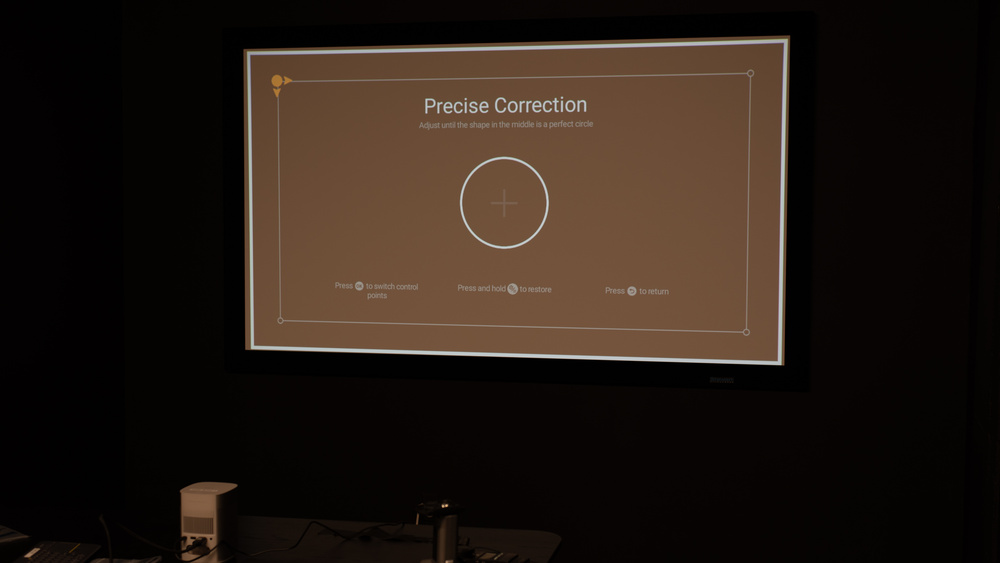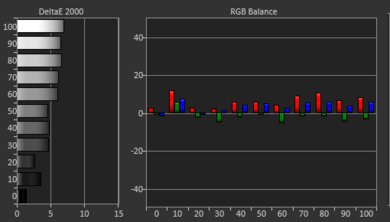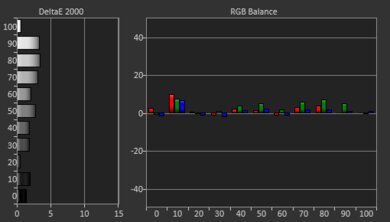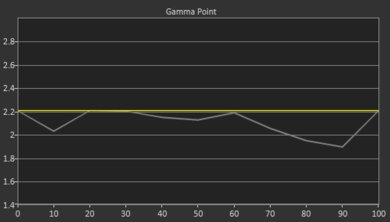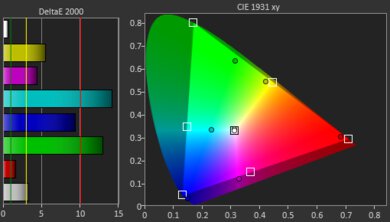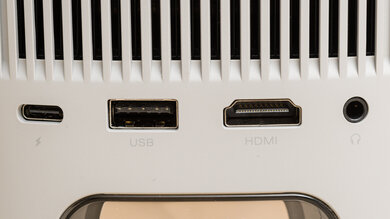The XGIMI MoGo 2 is a lightweight 720p HDR projector. It's small and light, making it easy to carry around, and it's easy to install and use with Auto Keystone correction, intelligent obstacle avoidance and screen alignment, and an autofocus. The projector uses an LED bulb as its light source with a rated lifespan of 25,000 hours. It can project an image between 40" and 200", although XGIMI recommends that users stick to 60-120 inches for optimal image quality. It has many smart features with the Android TV 11.0 smart interface, Chromecast, Wi-Fi 5, and Bluetooth 5.0. Finally, it has two built-in 8W speakers with Dolby Audio, Dolby Digital, and Dolby Digital Plus support.
Our Verdict
The XGIMI MoGo 2 is sub-par for watching movies. It's just not bright enough for even moderately lit rooms, and its contrast is mediocre, so it looks fine but unimpressive in dark rooms. The projector has poor pre-calibration image accuracy, and you can't improve it much through the device's limited calibration options.
-
Full suite of smart features.
-
Small and light, and has a slew of image correction features for a quick install.
-
Poor brightness levels results in very dim images.
-
Poor pre-calibration accuracy that can't be improved enough through its limited calibration options.
- 5.8 Movies
Changelog
-
Updated Nov 13, 2024:
We mentioned the newly reviewed NexiGo PJ40 (Gen 3) in the Contrast section of this review.
- Updated Aug 07, 2024: Mentioned the newly-reviewed LG CineBeam PF50KA in the Projector Technology section of this review.
- Updated May 21, 2024: Updated text throughout the review according to Test Bench 0.9, mainly in the Contrast section.
- Updated May 21, 2024: We've converted this review to Test Bench 0.9. We've overhauled our Contrast tests, as we now measure contrast at various average pixel levels (APL). You can see the full changelog here.
- Updated Feb 26, 2024: Mentioned the newly reviewed XGIMI MoGo 2 Pro in the Contrast section of this review.
Differences Between Sizes And Variants
We tested the XGIMI MoGo 2 mini projector. It's the cheapest projector in XGIMI's Portable Projectors lineup, sitting below the XGIMI MoGo 2 Pro and the XGIMI Halo+.
| Model | Battery | Resolution | ARC/eARC |
|---|---|---|---|
| MoGo 2 | No | 720p | ARC |
| MoGo 2 Pro | No | 1080p | ARC |
| Halo+ | Yes | 1080p | eARC |
Our unit was manufactured in September 2023; you can see the label here.
Compared To Other Projectors
The XGIMI MoGo 2 is a small and lightweight projector. It's not very good, but it's quite cheap and better than other products in its price range, like the Kodak Luma 150. It'll do fine if you're looking for a super lightweight projector that you can quickly throw into your backpack, but if you can stretch your budget a little, the XGIMI Elfin and XGIMI Halo+ are better products in almost every way.
Check out our recommendations for the best portable projectors and the best outdoor projectors. If you'd prefer to shop for another product in the same price range, look up the best projectors under $500 instead.
The XGIMI Elfin is a bit better than the XGIMI MoGo 2. The Elfin is the much more accurate of the two projectors, and it can also passthrough advanced audio formats through its eARC port, while the MoGo 2 Pro is limited to ARC.
The XGIMI MoGo 2 is a bit better than the Samsung The Freestyle 2nd Gen. The XGIMI is very dim, but it's brighter than the Samsung. The XGIMI also has better contrast and is the more accurate of the two projectors.
The XGIMI MoGo 2 is better than the XGIMI MoGo 2 Pro. The base MoGo 2 gets a bit brighter and has slightly better contrast than the more expensive Pro. While they're both inaccurate, the Pro is even more so out-of-the-box than the MoGo 2. Ultimately, the only advantage of the Pro is that it projects a sharper 1080p image versus 720p for the MoGo 2.
The XGIMI Halo+ is better than the XGIMI MoGo 2, although, unfortunately, the Halo+'s pre-calibration accuracy is much worse than the MoGo 2's already inadequate accuracy. Thankfully, you can improve the Halo+'s accuracy significantly through calibration. The Halo+ has otherwise better image quality, better brightness and contrast, a slightly wider color gamut, and projects a sharper 1080p resolution image versus 720p for the MoGo 2. The Halo+ also has an integrated battery, making it even more portable than the cheaper MoGo 2.
The XGIMI MoGo 2 is slightly better than the Anker Nebula Capsule 3 Laser, although the Anker has a slight edge in portability. The Anker has a built-in battery pack, which they advertise to be good for up to 2.5 hours of playback. The XGIMI, however, is much brighter than the Anker, so it's a bit more forgiving when it comes to lighting conditions.
The XGIMI MoGo 2 and NexiGo PJ40 (Gen 3) have slightly different usages. The XGIMI is a fully portable projector, as it's small enough to be carried around. The NexiGo is bigger and meant for use within the home. The NexiGo is the brighter projector of the two and has much better contrast. The XGIMI has a fully functioning Android TV implementation, while the NexiGo requires a streaming dongle to access any streaming apps. Ultimately, the NexiGo is the better option if you're looking for something to use in your home, while the XGIMI is the better option to carry with you.
The XGIMI MoGo 2 is better than the BenQ GV30. They're both small and light projectors that are easy to carry around. The BenQ GV30 has an integrated battery and can be rotated vertically on its stand, while the XGIMI doesn't have those features but has a full suite of auto keystone correction features. The XGIMI offers better image quality, with higher peak brightness and better color accuracy, although you need to calibrate the XGIMI for its colors to be decent.
The XGIMI MoGo 2 is better than the KODAK LUMA 350, as the XGIMI offers better image quality in any room context. Still, while they're both portable projectors, the KODAK is much smaller than the XGIMI, and comes with an integrated battery. So, if you need a projector that you can easily fit in your pockets the KODAK is the better option, but the XGIMI easily fits into a backpack; just make sure you have a portable battery pack.
The XGIMI MoGo 2 is much better than the KODAK LUMA 150. The KODAK has one advantage: portability. It's so small that you must see it to believe it, and it even comes with an integrated battery. Unfortunately, that extreme portability comes at a cost, as the KODAK's image quality is abysmal, with terrible brightness and poor contrast, as well as some of the worst pre-calibration accuracy possible, which you can't even improve through calibration.
The XGIMI MoGo 2 is better than the LG CineBeam PF50KA. The XGIMI is even easier to move around due to its full suite of image correction features. Unfortunately, unlike the LG, it doesn't have an integrated battery, so you must plug it into an outlet or external battery pack. The XGIMI only projectors images in 720p, so the LG is sharper overall due to its 1080p image. Still, the XGIMI is brighter, has better contrast, and is much more accurate, giving it a better, if softer, image overall.
Test Results
The XGIMI MoGo 2 has a compact design and weighs only 2.4 pounds, but it doesn't have an integrated battery, so you still need to plug it into an outlet. It has full Auto Keystone correction and autofocus, so it's easy to set up. The projector has two integrated 8W speakers, so you won't need to worry about connecting it to a soundbar or audio system when bringing it with you.
This 720p DLP projector uses an LED bulb as its light source, and it's rated for up to 25,000 hours by the manufacturer, so you likely won't ever have to worry about replacing it. If you'd prefer a sharper 1080p image, consider the LG CineBeam PF50KA instead.
The XGIMI MoGo 2 is a dim projector, so you need to turn off the lights for a pleasant viewing experience. It does have stellar brightness uniformity, so there's little variation in brightness between the sides and the center.
This projector's contrast is mediocre, as its blacks are just not that dark when contrasted with its very dim whites. Overall, it will look fine but unimpressive in a dark room. This product's higher-tier cousin, the XGIMI Halo+, has better contrast, and so does the NexiGo PJ40 (Gen 3).
This projector has inadequate color accuracy out-of-the-box. Its white balance and colors are quite inaccurate, with reds being overrepresented in most shades of white. All colors are inaccurate to a degree, with blues being the worst. Thankfully, the projector's color temperature is fantastic, even if it's slightly on the warm side.
The projector only has one-point white balance calibration, so you can't do much. Still, you can improve the projector's white balance significantly, minimizing accuracy errors in the process, although some colors are still overrepresented in certain shades of white. Unfortunately, while calibration improves colors, they're still inadequate, with blues still being the worst.

